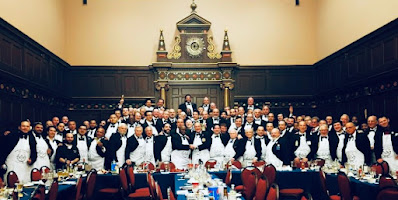The Allen E. Roberts Library and Museum of the Grand Lodge of Virginia seeks a new Executive Director. (God, I’d love to be Executive Director of the Allen E. Roberts Library and Museum!) From the publicity:
 |
| GL of Virginia |
Executive Director of the Allen E. Roberts Library and Grand Lodge of Virginia AF&AM Museum will be a scholar and manager active in all aspects of the Library and Museum and an integral and essential member of the team. The Executive Director will ensure the Virginia Masonic family and generally the world Masonic community is aware of and able to access the collections associated with this endeavor.
Incumbent will report to the Board of Directors of the corporation.
Application deadline: March 1, 2024.
Resumes can be forwarded to:
The Grand Lodge of Virginia
4115 Nine Mile Road
Richmond, VA 23223-4926
Position
Executive Director of the Allen E. Roberts Library and Grand Lodge of Virginia AF&AM Museum.
 |
| GL of Virginia |
The Executive Director will be a scholar and manager active in all aspects of the Library and Museum and an integral and essential member of the team. The Executive Director will ensure the Virginia Masonic family and generally the world Masonic community is aware of and able to access the collections associated with this endeavor.
Purpose
 |
| GL of Virginia |
The Grand Lodge of Virginia Library, Museum and Historical Foundation, and the Allen E. Roberts Masonic Library and Museum of Virginia, Inc. is seeking a vibrant, enthusiastic and dynamic person to direct, organize and curate the Allen E. Roberts Library, the Grand Lodge of Virginia, AF&AM Museum and assist in the curating of such other Virginia Masonic collections as may come under the purview of the Corporation.
Responsibilities
Report to the Board of Directors of the corporation.
Approve, catalog and document all acquisitions including books, ephemera, recordings, furnishings and other items.
 |
| GL of Virginia |
Create policies, including accession and declination policies, for the Library and Museum, including the preparation of such forms as may be necessary for such purposes, for review and approval by the Board of Directors.Ensure that Library and Museum holdings are available for Masonic and scholarly use.
Assure proper stewardship of all Library and Museum materials and holdings.
 |
| GL of Virginia |
Employ proper conservation techniques and methods to preserve and maintain all collections to make the same available for the longest possible time.Represent the Library and Museum where necessary and as requested by the Board of Directors.
Increase engagement with members of the Masonic Fraternity.
Establish clear goals for the collection and share the same with the Board of Directors.
Deepen fraternal and public awareness of the Library and Museum and publicize its holdings to encourage use.
Serve as a visible and articulate spokesperson for the Library and Museum.
Assist in fundraising matters on individual initiative and at the request of the Board of Directors.
 |
| GL of Virginia |
Supervise docents, interns and volunteers and manage the scheduling of such persons.
Prepare a budget and discuss budgetary matters with the Board of Directors.
Manage special use and restricted funds.
Assist in planning major purchases and capital expenses of the Library and Museum.
Prepare and oversee Library and Museum publications.
Manage the physical integrity and security of all Library and Museum spaces.
Grow the holdings of the Library and Museum.
 |
| GL of Virginia |
Salary Range
$46,500 to $68,500
Requirements
 |
| GL of Virginia |
A strong commitment to historical preservation, research and scholarship.A strong commitment to working with a team and a Board of Directors.
Bachelor’s Degree in library science, history, museum science, related field or equivalent experience.
Ability to work independently.
A passion for history.
Ability to use Past Perfect computer software.
























